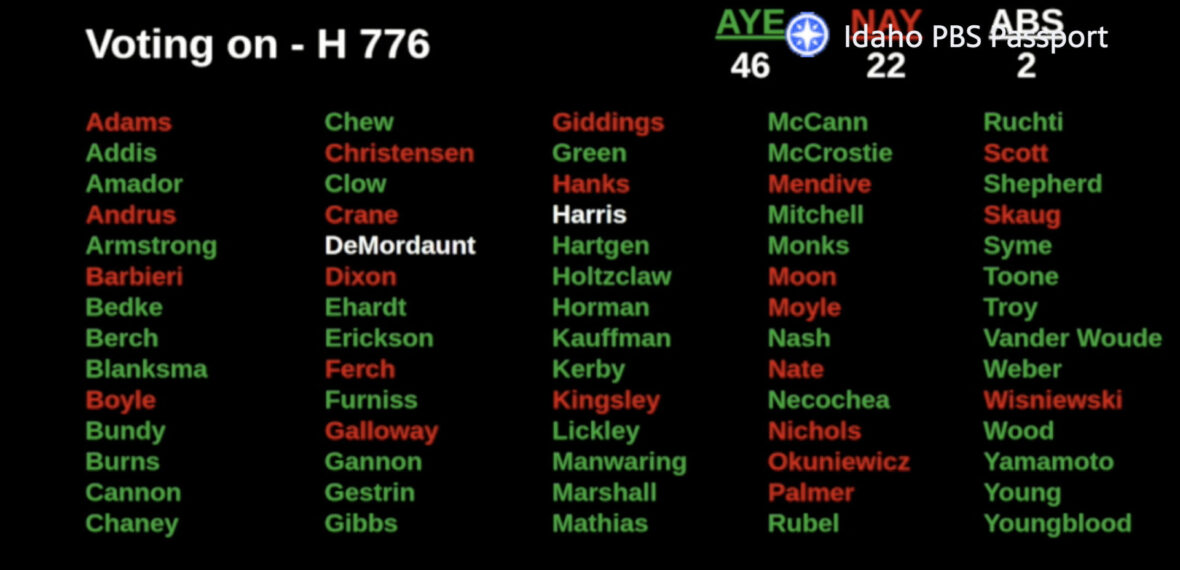
This year, for higher education, the first time was the charm.
The House easily passed a $338 million general fund budget for the state’s four-year college and universities Wednesday afternoon — on a bipartisan, 46-22 vote.
Wednesday’s vote on House Bill 776 stands in stark contrast to the past two legislative sessions. In 2020 and 2021, the House held down higher education budgets — as conservative hardliners sought to rein in diversity, equity and inclusion programs. And the hardliners prevailed a year ago, forcing legislative budget-writers to rewrite the budget, imposing a $1.5 million cut at Boise State University and $500,000 cuts at the University of Idaho and Idaho State University.
Wednesday’s 20-minute debate again focused on diversity issues. Critics said the schools still haven’t gotten the message from legislators, pursuing a social justice agenda in spite of last year’s cuts. The budget’s floor sponsor, Rep. Paul Amador, pointed to outside audits that found no evidence of indoctrination at Boise State and U of I. He urged colleagues to pass a budget that will allow the schools to freeze in-state undergraduate tuition for a third successive year.
“I think (this budget) helps our students, and that’s ultimately who we are trying to help,” said Amador, R-Coeur d’Alene. “By freezing their tuition, we’re helping them essentially avoid a tax on their lives.”
Thirty-four of 56 House Republicans supported the budget, joining all 12 House Democrats.
Wednesday’s vote represented the first hurdle for the higher ed budget — and likely the biggest obstacle. The budget now goes to the Senate, which has handily approved higher ed budget in past years.
The budget breakdown
The $338 million from the general fund — primarily from state sales and income taxes — represents nearly a $25 million increase. It is likely the largest dollar-for-dollar spending increase in higher ed in state history.
The general fund does not account for the entire higher ed budget. Factoring in dedicated funds, such as student tuition and fees, the four four-year schools would receive more than $643 million.
Among the key line items:
- An additional $3.4 million to cover employee pay raises. Gov. Brad Little has requested a 5% pay raise for all state employees, including campus employees. Historically, colleges and universities have covered pay raises with general funds and tuition and fees — and college administrators said they could not cover a 5% pay raise without raising tuition.
- A one-time $4 million payment to Boise State from the Higher Education Stabilization Fund, a state rainy-day account. This is designed to help Boise State cover the cost of pay raises from last year.
Fully covering the pay raises, and heading off a tuition increase, was a priority for the Joint Finance-Appropriations Committee working group that drew up HB 776, said Amador, a JFAC member.
The budget debate
The debate instead focused, once again, on campus diversity issues.
Rep. Vito Barbieri, R-Dalton Gardens, spoke at length about the job application process, citing examples of positions that require applicants to submit statements on diversity issues. While the four-year schools continue to push the diversity issue, he said, lawmakers have no resource but to push back in the budget-writing process.
“And that’s unfortunate, because higher education is necessary,” Barbieri said. “Higher indoctrination, not so much.”
Twice, lawmakers asked Barbieri if he would answer questions about his debate. Twice, Barbieri refused.
Rep. Ron Nate, R-Rexburg, again said the universities are funding diversity, equity and inclusion positions, defying the Legislature’s orders to rein in such programs. It was a shorter and less detailed version of Nate’s debate in JFAC two weeks ago — when he based an attempt to cut the higher ed budget entirely on an essay from the Idaho Freedom Foundation, a hardline group that has led the pushback against higher ed.
Nate dismissed the outside audits of Boise State and U of I, conducted by Hawley Troxell, a Boise law firm. “If they were looking for (indoctrination), they didn’t look very hard. It’s there.”
On Wednesday, one member of House Republican leadership pushed back.
GOP caucus chair Megan Blanksma, R-Hammett, cited a letter to legislators, written by U of I President Scott Green. Writing on behalf of the four presidents, Green said the schools are committed to follow House Bill 377, the anti-indoctrination law passed in 2021, and Green invited lawmakers to see for themselves.
“If you really want to see whether critical race theory or whatever issue is being taught at your universities, they’ve given you an invitation to walk in the door,” Blanksma said. “This is a good budget and we need to fund our universities.”
